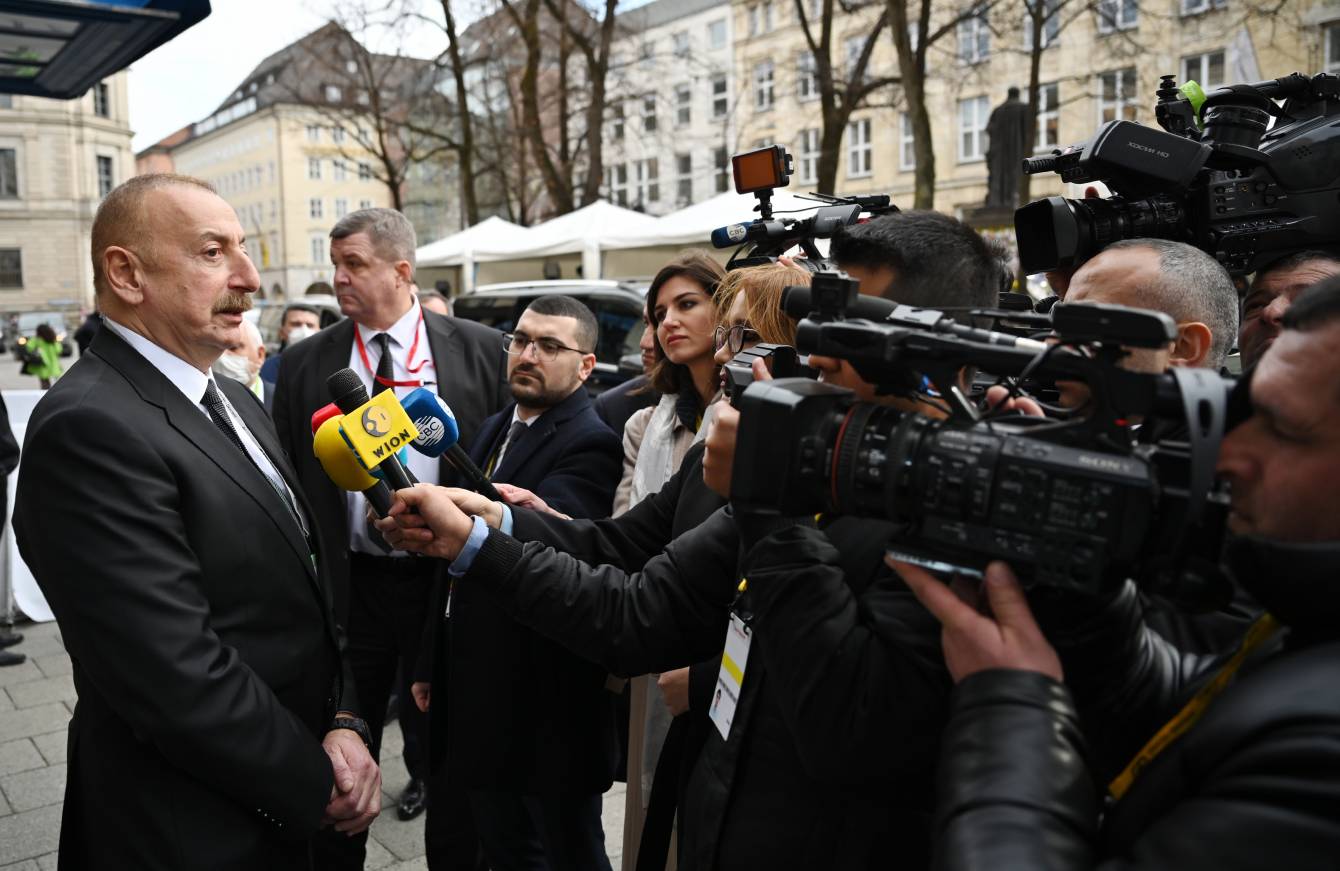President Ilham Aliyev has updated the international community on the peace negotiations with Armenia at a plenary session held as part of the Munich Security Conference on Saturday.
He said Azerbaijan and Armenia need to demonstrate that the transition from the long-lasting stand of mutual hatred is possible and hostility must end with the signing of a peace treaty.
“We are now working on a peace agreement between Armenia and Azerbaijan. Hopefully, we will conclude it sooner or later. And that could be an excellent example of how countries with serious historical disagreements can get together and turn the page of hostility,” President Aliyev said at the panel discussions, President.Az informs.
“The key thing is that this peace agreement should be based on international norms and principles. Any provision in relation to Karabakh is unacceptable. Azerbaijan’s position in this respect has been communicated. Three days ago, we received new responses to our proposals from Armenia. We are elaborating them now. At first glance, there is progress in Armenia's position, but it is not sufficient. So this is the main issue discussed.”
According to him, Azerbaijan, Armenia, and American and European partners share a common understanding that there should be a two-track approach to the situation in the region. First, the Azerbaijan-Armenia peace talks track. Second, Azerbaijan’s communications with the Armenian population in the Karabakh region of Azerbaijan.
For this to progress, Armenia and international partners should also abandon use of non-existent terms, such as “Nagorno-Karabakh”, President Aliyev noted.
“The word Nagorno-Karabakh is no longer valid. This is the Russian word. “Nagorno” means mountainous. And in Azerbaijan, there is no such administrative unit like Nagorno-Karabakh. Therefore, I ask our partners to respect Azerbaijan's sovereignty and constitution. There is a Karabakh region of Azerbaijan with an Armenian population,” he explained.
President Aliyev said peace would have been achieved in the region decades ago if the OSCE Minsk Group and the Security Council of the United Nations obliged Armenia to conform with the UN resolutions and international law. However, their inaction, according to the Azerbaijani president, sparked a common understanding that this conflict is frozen.
“We proved that it is not frozen. We had to fight. We had to sacrifice 3,000 lives to restore our dignity, territorial integrity and justice, and implement UN Security Council resolutions,” President Aliyev noted.
The negotiations for signing a peace treaty between Azerbaijan and Armenia have been moving quite slowly due to irrelevant demands from the Armenian side, including about the so-called rights of the Armenian population in the Karabakh region of Azerbaijan.
On February 15, the Armenian authorities submitted their response to the peace proposal of Azerbaijan, which is based on five basic principles conveyed by Baku to Yerevan in February 2022. These principles highlight the key issues related to the peace negotiations between the two countries, including mutual recognition of respect for the sovereignty, territorial integrity, inviolability of internationally recognized borders; mutual confirmation of the absence of territorial claims against each other; obligation to refrain in interstate relations from undermining the security of each other; delimitation and demarcation of the state border; and unblocking of the transportation and other communications.
However, the talks are still stalling while Armenia attempts to declare the so-called rights and securities of the Armenian population in the Karabakh region of Azerbaijan by adding a relevant article to the peace treaty. Based on the country’s Constitution and international law, Azerbaijani authorities turn down such initiatives. President Aliyev has repeatedly stated that no third country should be involved in Azerbaijan’s internal issues like communications with Armenians in the Karabakh region.
“We cannot allow the Karabakh issue to be included in the agreement to be signed between Azerbaijan and Armenia in any form […] We want Armenia to give up its territorial claims against us and normalization to happen,” President Aliyev told reporters in Munich on Saturday.
Armenia and Azerbaijan had long been at odds over the latter’s Karabakh (Garabagh) region. Following the Soviet Union’s dissolution in 1991, Armenia launched full-blown military aggression against Azerbaijan, marking the longest and deadliest war in the South Caucasus region. The bloody war ended with a ceasefire in 1994 and saw Armenia forcibly occupying 20 percent of Azerbaijan’s internationally recognized territories. Over 30,000 Azerbaijanis were killed, nearly 4,000 went missing, and one million were expelled from those lands in a brutal ethnic cleansing policy conducted by Armenia.
On September 27, 2020, the decades-old conflict between the two countries spiraled after Armenia’s forces deployed in occupied Azerbaijani lands shelled military positions and civilian settlements of Azerbaijan. During counter-attack operations, Azerbaijani forces liberated over 300 settlements, including the cities of Jabrayil, Fuzuli, Zangilan, Gubadli, and Shusha. The war ended in a statement signed on November 10, 2020, under which Armenia returned the occupied Aghdam, Kalbajar, and Lachin districts to Azerbaijan.
Shortly after the war, the Azerbaijani authorities voiced readiness and determination to launch negotiations with Armenia that would ultimately bring the long-awaited peace to the region.







 Iran's senior military leaders described the drone and missile attack on Israel on April 14 night as “successful".
Iran's senior military leaders described the drone and missile attack on Israel on April 14 night as “successful".
 The number of evacuees from flooded areas in Kazakhstan has reached 97,852 people, including about 32,856 children since March 27.
The number of evacuees from flooded areas in Kazakhstan has reached 97,852 people, including about 32,856 children since March 27.
 Iranian President Ebrahim Raisi warned Israel that it would face a "real and extensive" response if it makes any "mistake" following Tehran’s missi...
Iranian President Ebrahim Raisi warned Israel that it would face a "real and extensive" response if it makes any "mistake" following Tehran’s missi...



